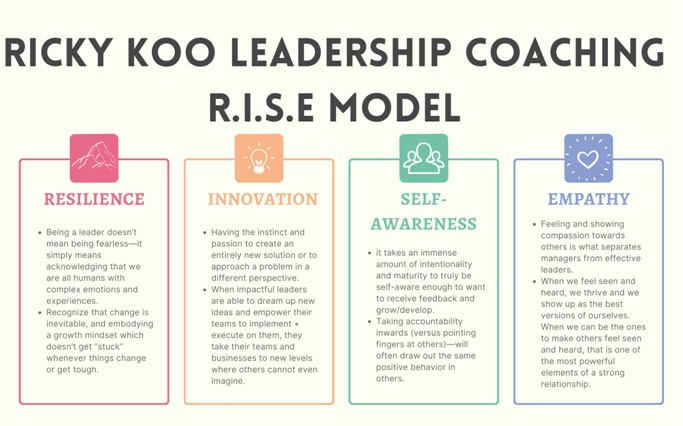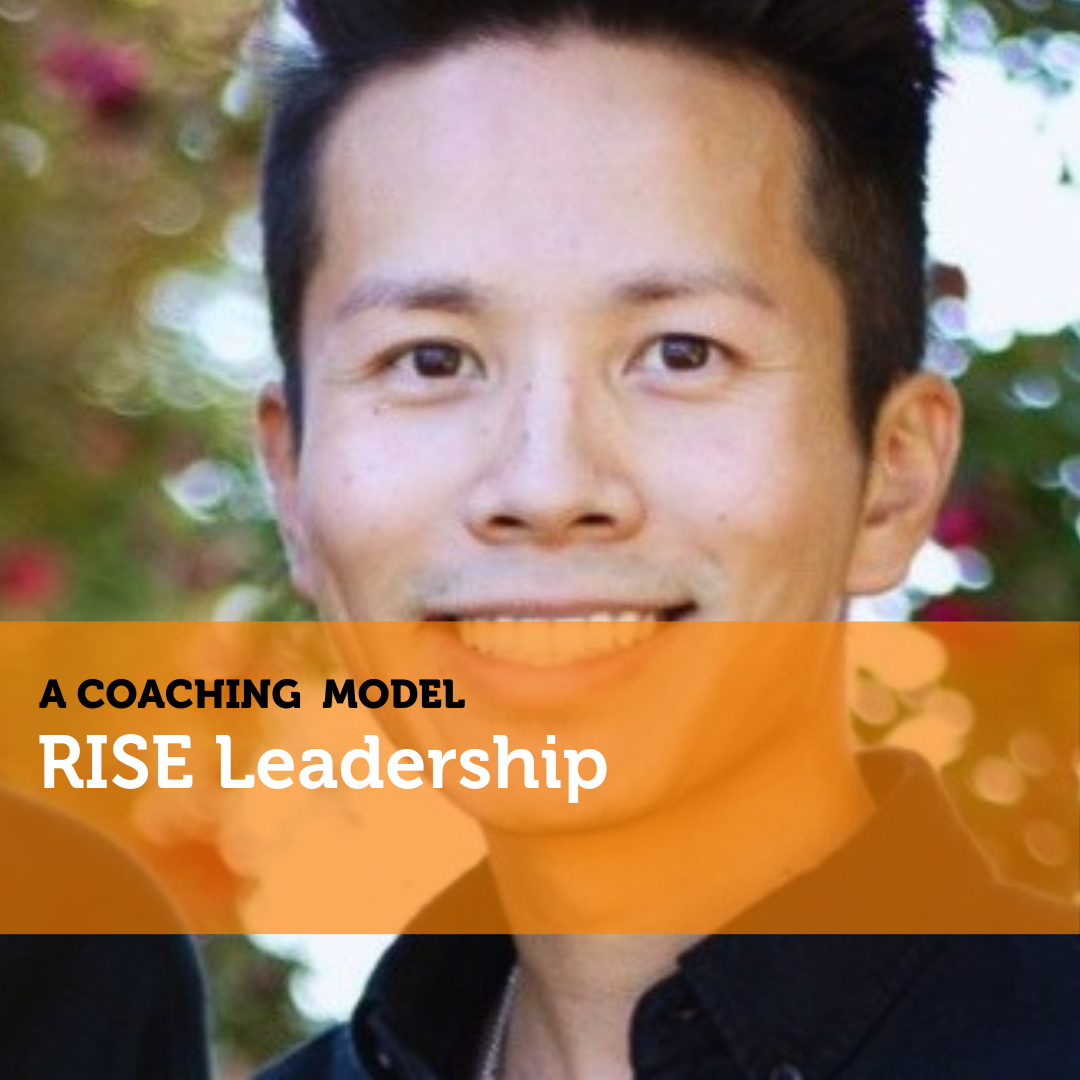A Coaching Model By Ricky Koo, Leadership & Communication Coach, UNITED STATES
RISE Leadership
My first experience with a Leadership Coach earlier in my career was terrible. I was introduced to a Leadership Coach through a colleague and the coach started our initial conversation by making it very clear to me that she usually doesn’t work with “people like me”, because I was still an individual contributor. It immediately made me feel embarrassed and uncomfortable and cast doubt over my mind. I had always felt as though you can be a leader even if you aren’t managing people. But in that moment, she made me feel so little and filled with doubt.
Fast forward to many years later, now that I am a coach myself, I actually want to thank her. She highlighted two very large problems that exist, which are two of the largest driving forces leading me to become a Leadership and communication coach for others.
- There is a lack of diversity in leadership roles, particularly in Corporate America. At the same time, there are plenty of Leadership Coaches that exist, yet when you search for them—you may notice that there is also a lack of diversity in the coaching industry. When I initially sought out my own coach, I struggled to find someone who looked like me. Someone who had navigated through the paths that I was facing as a minority. Someone who I trusted. Someone who I felt could actually hear me and understand me for who I was, not who they, or anyone else, thought I should be.
- The word Leadership is often misconstrued to make people believe that Leadership somehow is tied to someone’s title, hierarchy/ranking, age, how much money they make, and so on. In reality, Leadership has absolutely nothing to do with any of those. Despite that, a lot of those already in positions of power continue to strive to paint this picture of what a Leader should look like. Unsurprisingly, that picture is very often not a person of color. Especially in Corporate America, this false perception of a strong leader is someone who outwardly shows a lot of Power and wealth, has a bold Ego, and immense Assertion. Yet, some of the other most powerful human qualities and emotions are left behind.
RISE Leadership Coaching Model
My RISE leadership coaching model was created to rewrite the narrative of what true leadership is. The focus is on 4 different types of leadership: Situational Leadership, Thought Leadership, Internal Leadership, and External Leadership. Through my empowering facilitation and laser-focused coaching, people will develop techniques and skills in each of these critical areas so that they can be the most effective leaders in work and life. These qualities are more powerful than the surface-level/temporary qualities that are more visible and “outward”. These introspective qualities are what truly impactful leaders embody, and they span beyond age, ethnicity, title, industry, or even time.

Resilience (Situational Leadership): Being able to recognize that change is inevitable, and embodying a growth mindset that doesn’t get “stuck” whenever things change or get tough. It’s important to know that being a resilient leader doesn’t mean being fearless—it simply means when difficult situations arise and we have doubt or fear, we continue on because we have strong integrity, values, and grit. It means acknowledging that we are all humans with complex emotions and experiences. What it really comes down to is—when challenging situations arise that test your limits, do you maintain composure and approach it from a perspective of openness and curiosity?
Innovation (Thought Leadership): Having the ability to draw from prior experiences and apply them to new situations is a strong skill of a leader. Even more, having the instinct and passion to create an entirely new solution or to approach a problem from a different perspective takes time, energy, and development as a leader. When impactful leaders are able to dream up new ideas and empower their teams to implement/execute them, they take their teams and businesses to new levels that others cannot even imagine.
Self-Awareness (Internal Leadership): On the surface, we are all aware of ourselves to some degree. Some might even say that we are inherently egotistical beings because our worlds are so focused on us as the main characters. We see, hear, and experience everything in the world as ourselves so it is naturally difficult to not be “self-aware”. As a leader, however, it takes an immense amount of intentionality and maturity to truly be self-aware enough to want to receive feedback and grow/develop. Impactful leaders genuinely and openly receive feedback with grace, as they know that taking accountability inwards (versus pointing fingers at others)—will often draw out the same positive behavior in others around them.
Empathy (External Leadership): Allowing yourself to imagine and see yourself in someone else’s place is truly a humbling experience. Feeling and showing compassion towards others is what separates managers from effective leaders. Being empathetic towards others builds trust and also incentivizes your team members to stay committed to your team and business. When we feel seen and heard, we thrive and we show up as the best versions of ourselves. When we can be the ones to make others feel seen and heard, that is one of the most powerful elements of a strong relationship.
By intentionally focusing more on this RISE Leadership model, we can create a future with more self-aware, more empathetic, and more impactful leaders. These qualities also draw out more authenticity in people and shatter the misconception that in order to be a strong Leader, you must be loud, extroverted, or very outwardly assertive. It allows many different types of people to realize their own leadership potential and allows everyone to see that even a single, individual contributor earlier on in their career can still be an impactful leader in more ways than one.
Learn How to Create Your Own Coaching Model
Your Coaching Model reflects your values,
philosophies, and beliefs and must communicate who you will coach
and the problems you will solve. Read more about creating your coaching model
